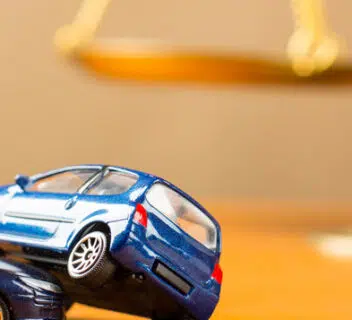Involved in a car accident and overwhelmed by the insurance claim process and/or the legal dispute process? An auto accident lawyer can help you navigate this stressful time and pursue compensation permitted by law based on the facts of your case. This article explains the essential steps in filing a claim, the critical role of accident lawyers, and why their expertise can make a significant difference.
Key Takeaways
Car accident claims are vital for recovering compensation for injuries and damages, with legal assistance crucial for navigating the insurance claims process.
Auto accident lawyers provide expertise in collecting evidence, following court procedural requirements, negotiating with insurance companies, and handling various car accident cases to advocate for a fair resolution under applicable law, with the aim to recover all legally-permitted damages supported by the evidence.
Understanding state-specific statutes of limitations (and the relevant exceptions) is essential, as failing to file a claim within the legal timeframe can result in losing the right to seek compensation.
Understanding Car Accidents
Car accidents are an unfortunate reality on our roads, affecting millions of people each year. Understanding the nature and impact of these incidents is crucial for anyone who drives or uses the roadways.
Car accidents can range from minor fender benders to severe collisions resulting in significant injuries or fatalities. A ‘car wreck’ is another term often used to describe a serious collision that can result in injuries, property damage, and legal claims.
The aftermath of a car accident can be overwhelming, involving medical treatments, insurance claims, and potential legal actions. By gaining a deeper understanding of car accidents, individuals can better prepare themselves to handle such situations and seek the necessary help when needed.
Car Accident Statistics
Car accidents are a leading cause of injury and death
Car accidents are a common occurrence on roads and highways, resulting in thousands of injuries and fatalities every year. According to the National Highway Traffic Safety Administration (NHTSA), there were over 36,000 fatalities in motor vehicle crashes in the United States in 2019.
These alarming numbers highlight the serious nature of car accidents and the devastating impact they can have on individuals and families. Common injuries from car accidents include broken bones, traumatic brain injury, whiplash, spinal cord injuries, and internal organ damage.
Beyond the tragic loss of life, car accidents also lead to significant financial burdens, including medical expenses, lost wages, and the costs associated with vehicle repairs. The emotional toll is equally profound, with victims and their families often experiencing pain and suffering that can last long after the accident.
Most car accidents are caused by human error
Human error is the leading cause of car accidents, accounting for over 90% of all crashes. This includes behaviors such as distracted driving, speeding, reckless driving, drunk driving, and failure to follow traffic laws.
Accidents often occur when a driver violated traffic laws, such as running a red light or speeding. For instance, texting while driving or driving under the influence of alcohol significantly increases the risk of a car accident.
While factors like vehicle maintenance and road conditions can also contribute to accidents, human error remains the most significant factor. Understanding these common causes can help drivers adopt safer practices and reduce the likelihood of being involved in a car accident.
Car accidents can have serious financial and emotional consequences
The aftermath of a car accident can be overwhelming, with victims facing a myriad of challenges. Financially, the costs can be staggering, encompassing medical expenses, lost wages due to time off work, and the expense of repairing or replacing damaged vehicles.
These financial burdens can place a significant strain on victims and their families. Emotionally, car accidents can lead to trauma, anxiety, depression, emotional trauma, and even post-traumatic stress disorder (PTSD).
The psychological impact can be long-lasting, affecting the overall quality of life. It is essential for car accident victims to seek the help of an experienced car accident attorney who can guide them through the legal process and ensure they receive the compensation they deserve for their medical expenses, pain and suffering, and other losses.
Common Causes of Car Accidents

Car accidents can happen in an instant — that’s just the harsh reality of driving — but here’s the thing: the reasons behind them are often preventable if you know what to look for.
Understanding the common causes of car accidents is essential not only for staying safe on the road, but also for car accident victims who need to know their rights and options for seeking compensation (and trust me, you do have options).
The causes of car accidents range from driver mistakes to mechanical failures and hazardous road conditions — it’s a wide spectrum of potential issues.
Simply put, by recognizing these common causes of car accidents, you as a driver can take proactive steps to avoid becoming just another statistic, and if you’re already affected by an accident, you can better understand how to pursue a car accident claim with the help of an experienced auto accident lawyer who knows the ins and outs of these cases.
Distracted driving
Distracted driving remains one of the most significant causes of car accidents today — and frankly, it’s a problem that’s only getting worse with our increasingly “connected” lifestyle.
Whether it’s texting (which is particularly dangerous), talking on the phone, eating, or even something as simple as adjusting the radio, any activity that takes a driver’s attention away from the road can lead to truly devastating consequences.
Let’s be clear about what this means for victims: car accident victims injured by a distracted driver often face mounting medical bills — sometimes in the tens of thousands of dollars — lost wages that can stretch for months or even years, and the emotional toll of pain and suffering that’s difficult to quantify but very real nonetheless.
That being said, if you’ve been hurt in a car accident caused by distracted driving, you may very well be entitled to fair compensation for your losses (and this compensation can be substantial).
Simply put, an experienced auto accident lawyer can guide you through the process of filing a car accident claim — they will advocate for you through negotiation and, if needed, litigation.
It’s really a win-win situation when you consider that most injury attorneys work on a contingency basis, meaning there’s no upfront cost to you.
Speeding
Speeding is another leading factor in car accidents — and if you’ve been affected by this dangerous behavior, you should know that it makes roads significantly more hazardous for everyone involved.
When drivers exceed posted speed limits, they have substantially less time to react to sudden changes (which can be critical in avoiding collisions), and the force of impact in a crash becomes much greater — often resulting in far more severe injuries than would otherwise occur.
That being said, speeding is especially dangerous in high-traffic areas, school zones, and construction sites, where the risk to pedestrians and other drivers is even more pronounced.
If you’re a car accident victim who has suffered injuries due to a speeding driver, you may very well be entitled to recover compensation for medical expenses, lost wages, and pain and suffering — but it’s important that you understand your legal options.
Simply put, working with a skilled car accident attorney can help you build a strong case, gather the necessary evidence, and negotiate effectively with insurance companies to secure a fair settlement that covers all your losses (and ensures you aim to recover all legally permitted damages.
Understanding Car Accident Claims
Claims resulting from car accidents are intended to assist those affected in recovering funds for injuries and damages stemming from such incidents.
Determining the at-fault party is crucial as they are responsible for compensating the injured party for damages incurred from the accident — and without fault, there is no lawsuit.
Identifying the at-fault driver is essential for establishing liability and securing compensation. In many cases, a negligent driver is the party whose actions caused the accident, and the other driver involved may also have their actions scrutinized to determine fault.
It is of utmost importance to pursue these claims as car accidents can impose considerable economic strains, encompassing costs for medical care, missed income due to inability to work, and damage sustained by property.
Professional legal guidance often becomes indispensable because managing the intricacies of an insurance claim without expert advice can prove overwhelming.
This procedure ordinarily involves initiating a claim with the at-fault driver’s insurance company. Should negotiations fail to yield an amicable resolution, it may be necessary for the dispute to advance into courtroom litigation.
Understanding this process thoroughly is vital in order to help you seek compensation for losses related to your accident.
Types of Damages in Car Accident Claims
Claims for car accidents typically encompass two primary types of damages: economic and non-economic.
Economic damages are those that cover concrete losses like medical bills, future medical costs, lost income due to missed work, and the cost of repairs or replacement for damaged property.
Calculating these costs is often a direct process involving specific figures from invoices, medical records, and financial records.
Conversely, non-economic damages address compensation for pain and suffering, which presents more difficulty in measurement.
In the tragic event of wrongful death resulting from car accident injuries, surviving family members may pursue remuneration for funeral expenditures as well as their intangible emotional distress.
Acknowledgment of both categories is essential when presenting an inclusive and equitable insurance claim or lawsuit following an automobile incident.
Who Can File a Car Accident Claim?
Every car accident victim, whether as a motorist, a passenger, or a pedestrian, is entitled to file a claim. Injury victims, as well as relatives of the deceased in instances of wrongful death, are also eligible to seek compensation. They too can submit claims that reflect their personal losses and trauma.
It’s essential for all parties impacted by such an event to understand who is eligible to pursue legal recourse. By obtaining knowledgeable legal counsel, individuals can better comprehend these rights and maneuver through the intricate procedure involved in filing a personal injury claim.
The Role of Car Accident Lawyers
Specialists in car accident claims, car accident attorneys, as well as injury lawyers and personal injury lawyers, adeptly handle the intricate legalities and insurance intricacies that emerge following a vehicle collision. They are crucial in leading clients through the aftermath’s legal labyrinth while safeguarding their rights to ensure just recompense with the help of an experienced lawyer.
Tasks undertaken by car accident lawyers include gathering and maintaining evidence, arranging for medical care, as well as liaising with insurance firms. The proficiency and assistance provided by these lawyers can significantly impact the resolution of an auto accident claim.
Investigating the Accident Scene
A primary action taken by a car accident attorney is to thoroughly examine the scene of car crashes. They focus on gathering crucial evidence, including details about the vehicles involved in the accident, which includes photographs, accounts from witnesses, and records of traffic regulations in the vicinity.
Such evidence plays an essential role in determining responsibility and rebutting potential allegations of carelessness.
Swiftly preserving this information enables lawyers to construct a robust case that underpins their client’s position. Conducting an exhaustive probe into the incident aids in pinpointing who is at fault—an important factor for obtaining financial restitution for their clients.
Communicating with Insurance Companies
Victims of a motor vehicle accident often find the process of negotiating with insurance companies daunting and taxing.
Lawyers who specialize in car accidents manage all interactions and discussions with these insurers, including insurance adjusters who handle claims and negotiations, advocating for their clients to obtain equitable settlements.
This enables those involved in the accident to concentrate on healing rather than on challenging negotiations.
Attorneys adept in this field are familiar with the methods employed by insurance firms aiming to reduce compensation amounts, and they possess the skills necessary to challenge such tactics successfully.
Their expert management of insurance claims is crucial in ensuring that adequate compensation is procured for their clients.
Calculating Damages
In the process of evaluating a car accident claim, determining the car accident case worth is essential.
This involves considering numerous elements such as physical injuries sustained, particularly in cases involving a serious injury, associated medical bills, damage to property, lost income due to time away from work, and any additional losses connected with the incident.
Attorneys are instrumental in this evaluation as they scrutinize medical reports and relevant paperwork to establish the rightful damages.
A knowledgeable attorney can typically pinpoint a more substantial sum for compensation than what an insurance company might propose at first glance.
Their expertise regarding both state and federal laws guarantees that every conceivable loss is considered when tallying up total damages — thereby assisting victims in securing complete restitution rightfully owed to them.
How Long After a Car Accident Can You Sue?
The law imposes a statute of limitations for filing claims related to motor vehicle accidents, setting a limited period after an injury during which legal action can be taken.
This duration differs across various states, and not adhering to this timeframe may lead to forfeiture of the opportunity to pursue compensation.
It is imperative for individuals contemplating legal recourse following a car accident to be aware of the applicable statute of limitations.
Swiftly consulting with an attorney will help guarantee that your claim complies with these essential time constraints.
Statute of Limitations by State
It is imperative to understand that the time frame for filing claims related to car accidents differs markedly across different states. As an example, while you have a window of five years in Missouri, Arizona offers only two years for such actions. Awareness of these unique state-imposed deadlines is vital so as not to forfeit your opportunity to file a claim.
Should one fail to act within the statute of limitations, their case could be rejected outright, thereby barring any chance of pursuing compensation. Hence, acquainting oneself with the particular time limits set by your state holds great importance.
Consequences of Missing the Deadline
Neglecting to file a claim within the designated period may result in significant repercussions, such as forfeiting the opportunity to seek compensation altogether. If a case is brought forward after the statute of limitations has lapsed, courts will typically reject it outright.
It’s imperative for those injured in accidents to move quickly and consult with legal counsel without delay following an incident. Promptness is essential to maintain your entitlement to compensation and guarantee that all required legal procedures are followed properly.
Steps to Take Immediately After a Car Accident
It is imperative to act swiftly following a car accident in order to safeguard your legal entitlements and bolster the potential of your forthcoming claim.
Documenting common car accident injuries, such as whiplash, fractures, and head trauma, is crucial to ensure all injuries are accounted for; even in a minor car accident, it is important to document every car accident injury to ensure proper compensation.
The measures you implement right after the incident can greatly affect the likelihood of obtaining optimal recompense.
An auto accident lawyer can assist you in managing this challenging period, guaranteeing that all critical steps are taken to preserve your interests.
Ensuring Safety and Contacting Authorities
Following a car accident, it is imperative to prioritize the well-being of all parties involved. Assess for any injuries and relocate to a secure area if feasible. It’s essential to dial 911 immediately in order to report the incident and seek medical assistance when needed.
Notifying law enforcement is key because they will produce an official police report, which becomes critical when filing insurance claims or engaging in legal actions. This document forms the cornerstone of your case during these processes.
Gathering Evidence and Documentation
Gathering evidence at the scene of a car accident is essential for constructing a robust case. Acquire the contact information and insurance details of everyone involved in the incident. Taking photographs of both the vehicles and location provides critical support for your claims.
It’s important to take sharp, comprehensive pictures to accurately record the situation. Such records are immensely helpful when you proceed with filing your car accident claim.
Seeking Medical Attention

It is critical to obtain medical care promptly following a car accident, even if you do not believe you have been hurt. Serious injuries can sometimes take time to present symptoms. Thus, an immediate and comprehensive examination is essential.
For the purposes of substantiating your case in potential legal disagreements, it’s important to meticulously record all medical treatment received and any sustained injuries. Proper documentation will make sure that every injury is considered while pursuing recompense.
Common Challenges in Car Accident Claims
Personal injury cases related to car accidents can be rife with difficulties. Victims of auto accidents, motor vehicle collisions, and other car crash incidents frequently contend with uncooperative at-fault parties, as well as insurance firms that resist cooperation in cases of car accidents, which adds complexity and stress to the claims process.
Navigating a car accident lawsuit and working toward fair car accident settlements can present additional challenges, including strict filing deadlines, the need to gather evidence, and the negotiation process required to resolve claims.
Understanding these prevalent challenges is beneficial for more effectively managing the claims journey. Enlisting legal support can greatly diminish these obstacles and enhance your likelihood of a favorable outcome when pursuing compensation for damages resulting from such incidents.
Dealing with Uncooperative Insurance Companies
Often placing their profits at the forefront, insurance companies may extend settlement proposals that fail to adequately cover damages. To diminish their own liability and cut costs, they might resort to tactics that blame the victims.
Attorneys are well-equipped to expedite negotiations toward more favorable outcomes when dealing with insurance firms. By amassing evidence that refutes any suggestion of victim fault, lawyers offer forceful advocacy against claims of contributory negligence.
Proving Liability
For securing compensation in a car accident case, establishing responsibility is essential. Lawyers gather all pertinent documentation from the scene of the accident, which includes police reports, medical documents, and accounts from witnesses. It’s critical to grasp the four key elements for ascertaining negligence: Duty, Breach, Cause, and Damages. Conducting a comprehensive examination assists in forming a robust argument and pinpointing liability.
Handling Comparative Fault
Under comparative fault statutes, individuals who are partially responsible for an accident can still obtain compensation corresponding to their degree of blame. Hence, should you bear some responsibility in the mishap, your recompense will be adjusted accordingly by diminishing it relative to your share of fault. That being said, there are strict contributory fault states, under which companies might not be “suable” for damages if the plaintiff was partially at fault for their own injuries.
Grasping the intricacies of these statutes is crucial for optimizing the amount you may receive as compensation. Legal professionals play a vital role in deciphering this complexity and aiding in securing an equitable settlement.
Benefits of Hiring an Experienced Car Accident Attorney
Employing a car accident attorney with extensive experience, especially an experienced attorney, can significantly affect the resolution of your auto accident case, helping to make sure that you are awarded the proper compensation. Seeking advice from such attorneys also sheds light on various legal avenues available to you, so it is wise to hire a car accident lawyer to maximize your chances of a successful claim.
These seasoned professionals play a pivotal role in procuring funds for covering medical expenses incurred due to an auto accident and typically offer their services on a contingency fee basis, meaning they get paid only if you win or settle. Their skilled guidance is crucial in steering through the complexities of legal proceedings and achieving an equitable settlement.
Maximizing Compensation
On average, individuals who have legal representation obtain 3.5 times more in settlement claims compared to those without lawyers. Skilled attorneys prevent victims from hastily agreeing to settlements before comprehensively grasping their complete entitlements. They can often uncover a significantly greater amount of compensation than the initial sum proposed by insurance companies, thereby optimizing your financial restitution.
Reducing Stress and Hassle
Attorneys alleviate the burden of navigating through the intricate legal procedures involved in a car accident claim, enabling their clients to concentrate on recuperating. This mitigates the strain and inconvenience that comes with handling an accident claim on one’s own.
Through overseeing negotiations and steering legal actions, lawyers offer reassurance while guaranteeing that every essential measure is employed to safeguard your rights within a car accident case.
How a knowledgeable personal injury attorney can help
Attorneys specializing in personal injury have the requisite expertise to adeptly handle the intricate legal aspects that follow an accident. Verifying a lawyer’s educational qualifications and certifications is crucial when dealing with a personal injury case, as it ensures they are adequately equipped to manage cases involving personal injuries.
The effectiveness and dependability of a lawyer can be gauged by examining client feedback and reviewing their track record in successfully managing cases similar to your own. This information provides meaningful perspectives on their ability to deliver favorable outcomes in matters pertaining to personal injury.
How to Choose the Right Auto Accident Lawyer
Selecting the right car accident lawyer is crucial for securing a fair settlement and effectively navigating the legal process. Many attorneys offer a free case evaluation, allowing you to assess your options and understand the merits of your case without any upfront costs. Evaluating their qualifications, experience, and client feedback ensures that you choose a lawyer with the expertise to handle your case.
Consider key factors such as the lawyer’s track record, client testimonials, and ability to communicate effectively throughout the selection process.
Checking Credentials and Experience
The makeup of a lawyer’s assortment of cases can reflect their reputation within the legal profession, especially when numerous cases are referred by peers. To ascertain if a lawyer is fit to represent you, it is crucial to authenticate their academic credentials, professional experience, and history of successfully managing comparable legal matters.
Peer review rating platforms like Martindale-Hubbell offer valuable perspectives on an attorney’s capabilities gauged by the esteem they hold with fellow lawyers.
Reading Client Reviews and Testimonials
It is crucial for prospective clients to consider reviews from previous clients when evaluating a lawyer’s quality and standing. Such feedback provides key insights into the lawyer’s communication skills and their approach to handling cases.
The success rate of an attorney, as disclosed through client testimonials, can significantly influence the decision-making process in selecting legal representation. These endorsements frequently underscore the attorney’s core competencies and specialization areas, which assist individuals in making a knowledgeable choice regarding their legal needs.
Scheduling a Free Consultation
To discuss your options with a local attorney, call 1-800-THE-LAW2 for a free consultation with an independent participating lawyer in your area. Availability varies by location and case type. No attorney-client relationship is formed until you sign a written agreement.
Summary
Grasping the intricacies of car accident claims and acknowledging the significance of a lawyer’s intervention is vital for obtaining rightful compensation, with achieving a car accident settlement being a primary objective. Lawyers are pivotal in sifting through details at the accident scene and dealing with insurance companies, which can be an intricate process following a car accident.
Enlisting an experienced car accident attorney enhances your prospects of receiving ample compensation while alleviating your stress levels, offering professional prowess to manage your claim efficiently. It is imperative to act promptly to safeguard your interests and obtain the assistance required to handle this situation.
Frequently Asked Questions
Any driver, passenger, pedestrian, or family member involved in a wrongful death can file a car accident claim.
This ensures that those affected have the opportunity to seek compensation for their losses.
You can claim both economic damages, such as medical expenses and lost wages, and non-economic damages, like pain and suffering.
It’s essential to document all your losses to strengthen your case.
You typically have between two to five years to file a car accident claim, depending on your state.
It’s crucial to be aware of this deadline, as missing it can forfeit your right to seek compensation.
Immediately after a car accident, ensure your safety, contact authorities, gather evidence, and seek medical attention.
Taking these steps is vital for protecting your legal rights and strengthening your claim.
An attorney with experience in car accident claims is skilled at conducting thorough investigations, adeptly negotiating with insurance companies, and precisely determining the extent of your losses to make certain that you are awarded just compensation.
The proficiency of such a lawyer simplifies proceedings and lightens your load during what can be a difficult period.















